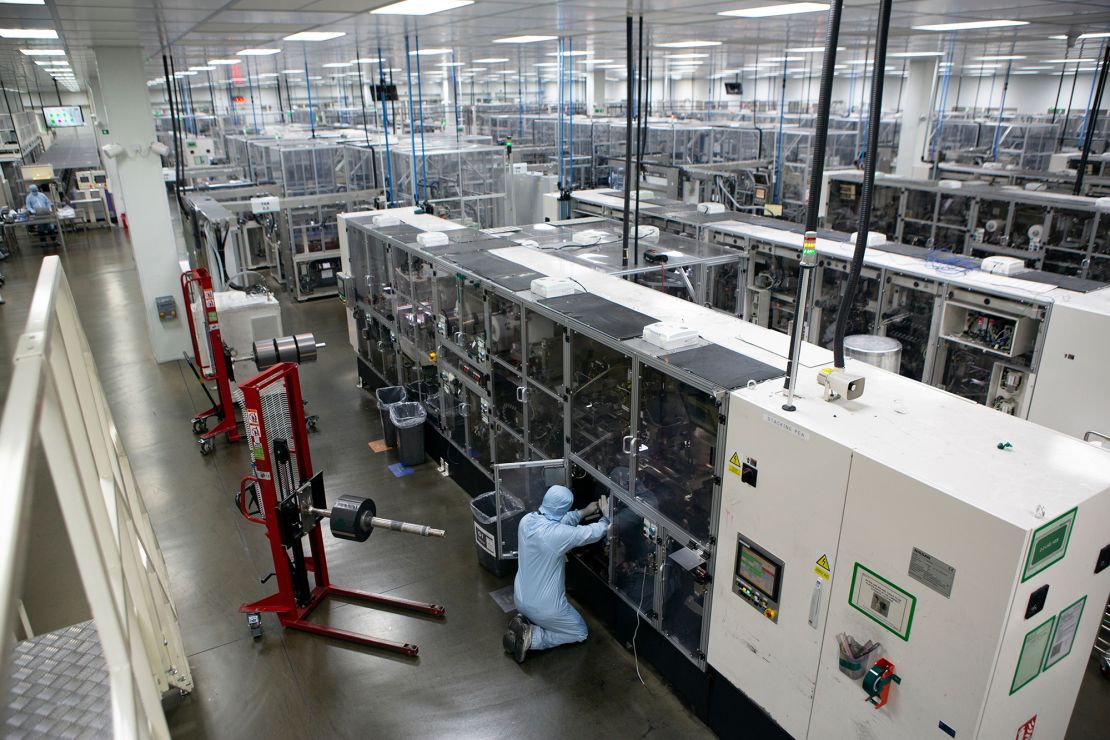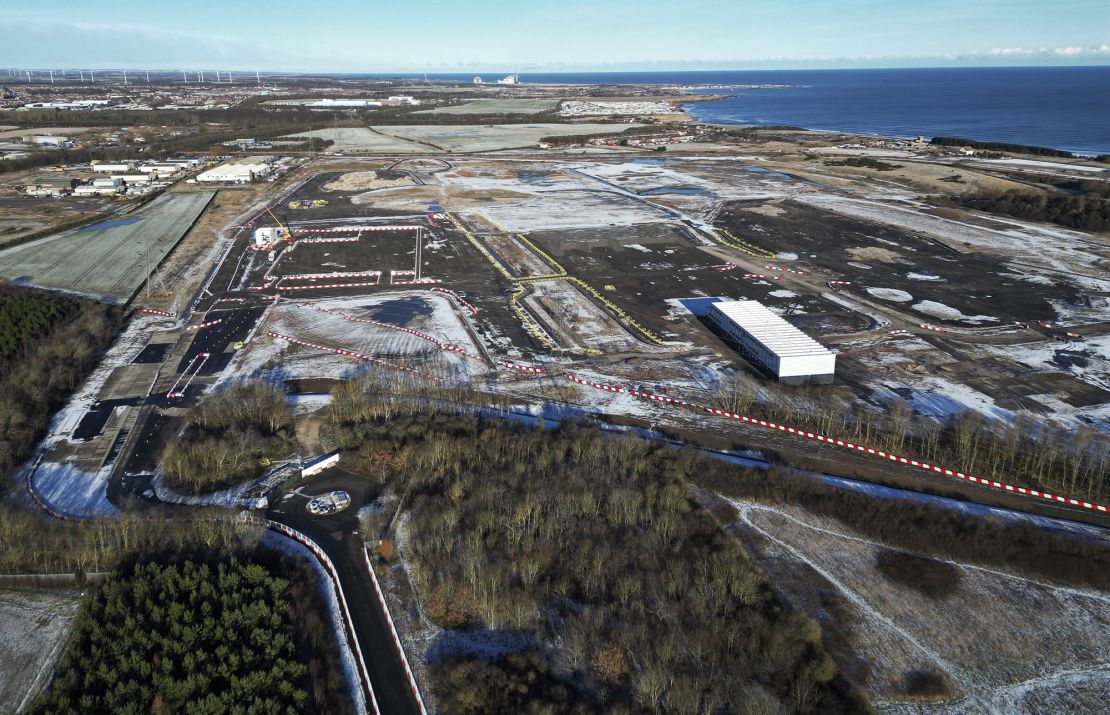UK car manufacturing hit a 66-year low in 2022, as the closure of two plants, a global shortage of semiconductors and the effect of Covid lockdowns in China on auto supply chains crippled output.
Figures published Thursday by the Society of Motor Manufacturers and Traders (SMMT), an industry body, showed that the number of passenger cars made in Britain declined 10% year-on-year to hit 775,014.
That’s the lowest total since 1956, and 41% down on the 1.3 million cars made in 2019 before the pandemic.
The UK auto industry has suffered a series of setbacks recently, including the closure of Honda’s (HMC) Swindon plant in 2021 and BMW’s (BMWYY) announcement in October that it will end production of the electric Mini in Oxford this year. The plant will produce internal combustion engine vehicles until those are banned in 2030.
The latest blow came last week when homegrown battery startup Britishvolt entered administration, the UK equivalent of filing for bankruptcy.
Britishvolt’s demise poses questions about whether auto manufacturing has a future in Britain if it doesn’t have the batteries it needs to power electric vehicles.
The company was planning to build a £3.8 billion ($4.7 billion) gigafactory in the north of England, which once complete would have produced enough batteries for over 300,000 electric vehicles a year, equivalent to nearly 40% of current UK vehicle production.
Its failure leaves Chinese-backed Envision AESC, which supplies Nissan (NSANF), as the only UK-based manufacturer of electric vehicle batteries ahead of the looming ban on the sale of petrol and diesel vehicles in 2030. Hybrids are set to be banned from 2035.

Andy Palmer, the former Aston Martin CEO, called Britishvolt’s collapse an “unmitigated disaster for the auto industry in the UK.” In an interview with the BBC, Palmer said the United Kingdom does not have the battery capacity to support the government’s electric vehicle ambitions.
“That means that ultimately British car manufacturing will migrate to where the batteries are. That is going to be in central Europe,” he added.
Other experts are far less gloomy, but in the wake of Britishvolt’s collapse, UK lawmakers have launched an inquiry into the viability of electric vehicle battery manufacturing in the United Kingdom.
“The future of car manufacturing in the UK is dependent on our ability to make electric vehicles, and to be able to export them into the EU,” Darren Jones, chair of the House of Commons business committee, said in a statement. “That means we need local supplies of electric vehicle batteries — something we’re falling significantly behind on compared to other parts of the world.”
No future without electric cars
Researchers at the Faraday Institution, Britain’s flagship battery-research program, estimated last June that by 2030, more than 1.5 million electric vehicles would be produced in the UK demanding more than 100 gigawatt hours (GWh) of battery capacity annually — the equivalent of five large gigafactories running at full capacity.
As it stands, Britain has just 36.9 GWh of capacity planned for 2030, according to the report.
By contrast, European gigafactory capacity projected for 2030 is expected to reach over 1,100 GWh across more than 40 plants. The largest planned is Tesla (TSLA)’s battery plant in Germany.
“The UK is making progress but not moving fast enough compared to its competitors in Europe and beyond,” the researchers said in the report.
Gigafactories take years to build, so car makers will be deciding in the next two to three years whether to locate future electric vehicle production in the UK or Europe, they added.
The US Inflation Reduction Act, which provides tax breaks for companies in America that make parts for green energy projects, will only make competition more intense.
Speaking to reporters on Wednesday, SMMT CEO Mike Hawes said that the UK government has “got to do something” to respond to the inflation act, which is going to “suck investment” into America’s electric vehicle industry.
The government must also address soaring energy costs through subsidies and incentivize investment in zero emission technologies, including batteries, according to Hawes.
There’s another reason the industry may already be suffering a slow death: Brexit.
Years of uncertainty over the terms of a trade deal diverted investment towards Brexit contingency plans and away from new technologies.
And risks remain. Under the Brexit trade deal that eventually replaced EU membership, tougher “rules of origin” requirements take effect next year.
They will require that a greater proportion of the parts in electric vehicles traded between Britain and the European Union are sourced from one of the two regions in order to avoid costly tariffs.
Neither side is ready to meet the deadline, according to Hawes. “The relationship between the UK and the EU, especially as you electrify, is still fundamental to the success of UK car manufacturing,” he said.

Despite mounting challenges, Hawes is optimistic about the future of auto manufacturing in Britain and expects car production to return to above 1 million over the next two years. UK factories made a record 234,066 electric vehicles in 2022, almost a third of all UK car production.
He said that the collapse of Britishvolt was “disappointing” but “not the end of the world.”
“I think there’s a danger that we talk ourselves down too much on the back of Britishvolt,” he added, noting that the startup’s site is likely to attract another investor given its proximity to an abundance of renewable energy and access to a deepwater port.
More than a dozen companies, including carmakers, have already expressed an interest in buying the land, the Financial Times reported.
Aston Martin and Jaguar Land Rover, owned by India’s Tata Motors (TTM), are also positive about the prospects for electric vehicle manufacturing in the United Kingdom.
Jaguar Land Rover announced Wednesday that it is transforming its Solihull facility between Birmingham and Coventry to make electric Jaguars and Range Rovers. “Our continued investment in our UK facilities … will herald an exciting new era of electric car production in the UK,” the company said.
Aston Martin, which sells about 6,000 vehicles a year, told CNN that Britishvolt’s failure will have no impact on its electrification strategy, with the launch of the first pure electric Aston Martin targeted for 2025.





